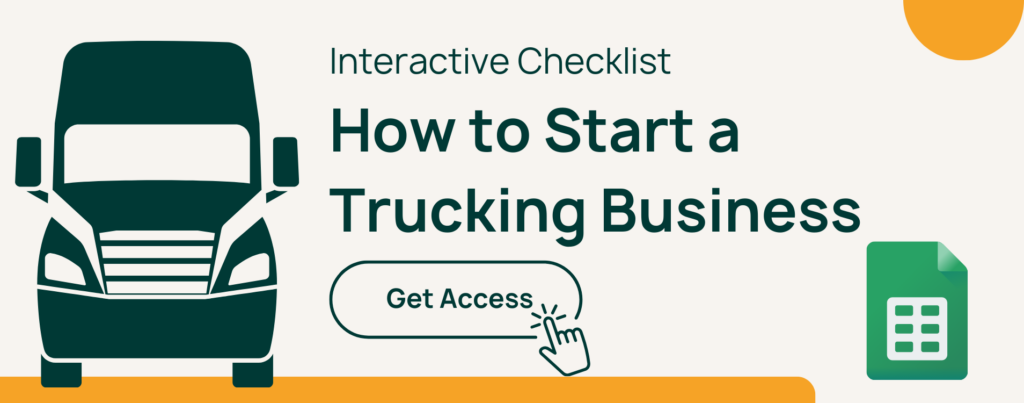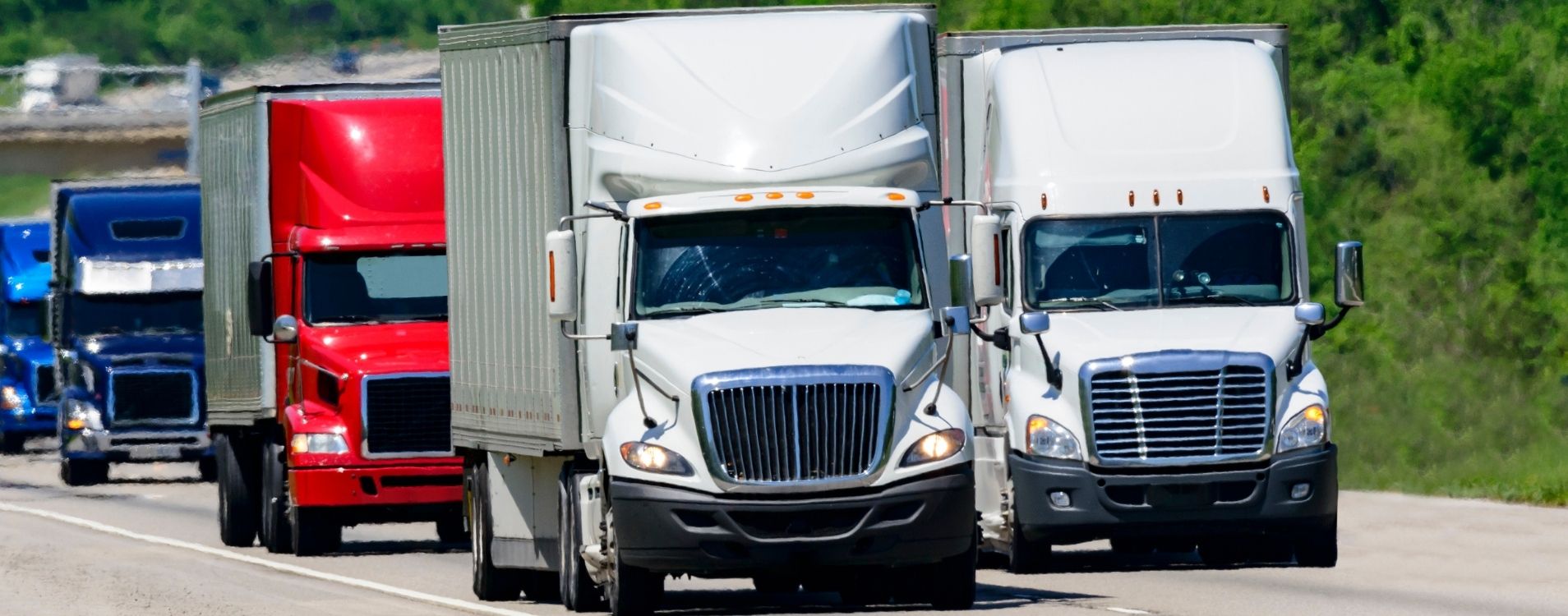How To Legally Establish A New Trucking Business
So you decided to start a trucking business. If you’re wondering what legal structure to get for your new company and the first steps to opening your company, you’re in the right place. We’ll break down everything you need to establish a small business and give you some recommendations specific to the trucking industry.
(PS: if our checklist tool can help you organize everything you need to start your business. Check it out by clicking below!)

If you’re an experienced trucking business owner, please consider leaving a comment below with anything we might have missed or additional advice you have for up-and-coming trucking entrepreneurs.
Please note that this article is not a substitute for legal advice and is based on our knowledge of the trucking industry. Please seek legal counsel if you are unsure of how to legally establish your company.
Leer este artículo en español.
Subscribe to our YouTube channel for more videos!
Choose The Best Legal Structure
A legal structure is a classification for your company that determines your tax and legal obligations. We wrote an article with more information about the different legal structures to choose from here.
To summarize, here are the different types of legal structures to choose from:
- Sole proprietorship
- Partnership
- Limited Liability Company (LLC)
- Corporation
- Cooperative
In short, remember that the trucking industry involves a lot of liability. Yes, you can protect yourself with good insurance, but the legal structure of your business is ultimately what will decide your level of personal responsibility. This is why we recommend a legal structure like an LLC or corporation that offers some separation between business and personal liability.
Pick A Name For Your Trucking Business
Once you’ve chosen the legal structure of your business, it’s time to register! This process varies by state. Most are managed by a Secretary of State’s office, Business Bureau, or Business Agency. Depending on your state, you may be able to register online or by mail.
Regardless of where you are, you’ll need to provide a business name. Many people dream for years of starting their own business, so you may have been thinking about this for a long time. If not, here are some tips for choosing a trucking business name to stand out from your competition:
Be unique
According to the USDOT, there are nearly one million for-hire carriers in the US. That’s a lot of competition! You’ll want to stand out from the crowd. The easiest way to know if your business’ name is unique is to do a quick Google search or, better yet, a query in a database like the Central Analysis Bureau, which provides information on all carriers operating in the country.
Less is more
When choosing a name, make sure it’s easy to remember and pronounce. That usually means keeping it short and using words with few syllables. Three to four words are generally recommended.
A name that fits you
Think about what ideas or feelings you want to evoke when people hear your business’ name. Speed? Efficiency? Trust? Reliability? Safety? Humor? Choose a name that fits the vision you have for your company, whatever that means to you. Every company has a brand, whether intentional or not. What do you want your brand to stand for?
Get An EIN From The IRS
An Employer Identification Number, or EIN, is the federal tax identification number given to every company. Regardless of your company’s legal structure, we recommend that you get an EIN because it’s required to open a business bank account and access other financial services.
We provided a full guide to getting an EIN in this article.
Apply For Permits And Licenses
As a new trucking company, you’ll need to obtain a number of permits through the Federal Motor Carrier Administration (FMCSA) and your state government:
- USDOT number: this identifies your business for federal safety monitoring, audits, inspections, and other processes.
- Operating Authority (MC number): this authorizes you to haul across state lines.
- Drug and Alcohol Clearinghouse for pre-employment drug screening and maintaining your license
- International Fuel Tax Agreement (IFTA) license, which simplifies the collection and payment of fuel use taxes across US states and Canadian provinces bordering the US.
Get Commercial Trucking Insurance
There are many types of insurance to choose from as a trucking company: general liability, primary liability, physical damage, non-trucking liability, cargo coverage, and more. More than a compliance requirement, insurance will protect your business’ interests when issues and accidents arise.
When comparing prices, make sure you look at the full cost of each option. Don’t simply choose the coverage the looks the cheapest because it could be more expensive in the long run if it doesn’t cover certain incidents or provide enough coverage for what you really need. We’ll cover more details about how to shop for insurance in another future article.
Insurance is one of the biggest expenses for trucking companies, but there are ways to reduce the cost:
- Employing experienced drivers with clean records
- Using newer equipment
- Avoiding high-population metro areas or areas with notoriously bad weather
- Build your company’s credit through a fuel card or other means
- Paying upfront on a quarterly or annual basis
- Choose a plan with a high deductible
Open A Business Bank Account
Before you accept a single payment on your first load as a new business owner, we highly recommend opening a business bank account. Not only will this help separate your business and personal expenses, but it will also allow you more protection against identity theft as well as opportunities to build your company’s credit.
To open a business bank account, you’ll need your EIN, articles of incorporation, ownership agreements, and business license. We’ll go into more detail about managing your business’s finances in future articles.
Prepare For Taxes Well In Advance
Don’t wait until tax season to learn about the taxes your business is responsible for paying. For example, if you’re a sole proprietor, you’ll need to pay a self-employment tax in addition to income tax. If you plan to hire employees in the first year of business, there are additional tax implications. What you pay in taxes for your business also varies by state and municipality or county.
In addition, you’ll want to plan for tax-deductible business expenses. These include:
- Meals and lodgings on the road
- Tools, gloves, and office supplies
- Fuel and diesel exhaust fluid for commuting to and from your truck
- Insurance premiums
- Retirement plans, depending on the type of fund
- Compliance fees
- Licensing and registration fees
- Leasing costs
- Association membership fees
- Contracted services
- Professional services
- Information and communication technology
- Home office square footage
- Startup expenses
We provided a guide to owner-operator taxes in this article. What you pay in taxes for your business also varies by state and municipality or county, so we highly recommend hiring a trustworthy tax professional to help you plan, preferably someone who understands the trucking industry.
Plan For Compliance
There’s a reason everyone talks about compliance in this industry. Staying up to date with paperwork and out of trouble with DOT is many owner-operators and fleet managers’ number one priority. It takes time and attention to detail to get these processes right.
Compliance for carriers can mean many things:
- IFTA quarterly taxes
- CDL renewals
- Vehicle maintenance
- Driver safety
- State regulations (hours of service, lane and cargo rules, etc.)
Making and sticking to a plan for keeping all your paperwork and processes in order is essential to running a successful trucking business.
Stay Up To Date
It’s important to remember that these legal requirements are not simple “set-it-and-forget-it” tasks. If you have a hard time keeping track of deadlines, renewals, and other processes, make a business calendar and set up automatic reminders so you don’t have to remember every date and task off the top of your head.
Once you have these legal requirements out of the way, you’re ready for the fun stuff: buying or leasing a rig, booking loads, and getting on the road!




